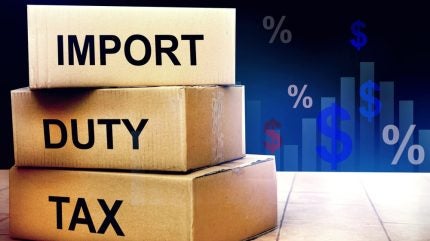
The United States’ decision to double tariffs on imported steel and aluminium to 50% in June 2025 has sent ripples through the global packaging industry.
Metal packaging producers—from food can makers to drinks suppliers—are now grappling with higher raw material costs, tighter supply chains, and fast-changing merger and acquisition (M&A) strategies.

Discover B2B Marketing That Performs
Combine business intelligence and editorial excellence to reach engaged professionals across 36 leading media platforms.
Rising metal costs drive up consumer prices
Steel and aluminium are the backbone of cans, caps, and closures used by global food and beverage brands. When tariffs were first introduced in 2018, the average price of canned soup and soft drinks climbed noticeably.
A similar pattern is emerging in 2025: US supermarkets have begun reporting slight price increases on tinned vegetables, pet food, and carbonated drinks as manufacturers pass on extra costs.
A midsized US can producer, for instance, said its aluminium sheet costs have jumped by nearly a third since the new duties took effect. Rather than absorb the hit, the company expects to raise contract prices for its customers in early 2026.
Economists warn that such cost increases could contribute to mild inflationary pressure in the broader grocery sector.

US Tariffs are shifting - will you react or anticipate?
Don’t let policy changes catch you off guard. Stay proactive with real-time data and expert analysis.
By GlobalDataSupply chains turn to alternatives
With imported metals becoming more expensive, some packaging firms are experimenting with substitutes. Flexible pouches made from recycled plastic or paper composites are gaining ground, particularly for items such as sauces and pet food.
A UK-based food brand recently replaced its steel tins with recyclable cardboard containers, cutting both weight and import costs.
Others are looking to nearshore production. Several North American packaging suppliers are investing in local steel rolling mills to reduce dependence on overseas inputs.
Industry analysts note that these strategies are costly in the short term but could protect companies from future trade disruptions.
Mergers accelerate amid volatility
The uncertain tariff environment has spurred a wave of mergers and acquisitions across the packaging sector. Larger companies are acquiring smaller, specialised firms to strengthen supply chains, expand sustainable product lines, and spread costs more efficiently.
For example, a European packaging giant recently bought a US aluminium can recycler to secure access to recycled material and lower its exposure to import tariffs.
Private equity investors are also active, targeting companies with strong automation, compliance, and sustainability records. In the UK, the introduction of Extended Producer Responsibility (EPR) rules—which make companies pay for the recycling of their packaging—has further encouraged deals that enhance environmental credentials.
Outlook
The combined forces of tariffs, regulatory shifts, and sustainability demands are reshaping the global packaging landscape.
As 2026 approaches, manufacturers are expected to continue adjusting product designs, sourcing models, and partnership strategies to manage volatile costs.
For consumers, the most visible sign may be slightly higher prices—and new types of packaging appearing on supermarket shelves.
Navigate the shifting tariff landscape with real-time data and market-leading analysis. Request a free demo for GlobalData’s Strategic Intelligence here.





